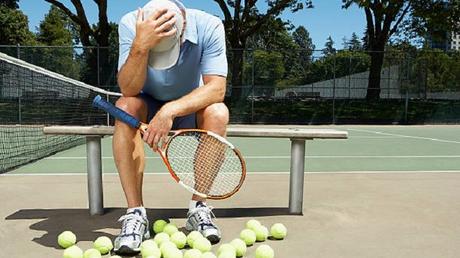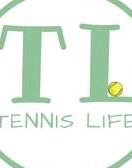
No matter how much you may love tennis, there may be a time when you experience "burnout". This happens a lot among recreational players.
Burnout in tennis can be defined as physical, emotional and/or mental exhaustion, and it can take its toll on any player. But it can be conquered. If you can pinpoint the source of the frustrations, you can not only overcome them but also keep them from reoccurring in the future.
Here are some of the most common causes of burnout, along with proven solutions that will help you stay or get back out on the courts with a positive mindset!
Your fitness level isn't what it should be.
This one is probably the biggest single cause of tennis burnout because you can't play your best tennis just from playing a lot - even if you take lessons. Tennis is a very physical sport and in order to avoid hitting a plateau which can lead to early burnout, you need to be in good shape.
- For some, this may mean losing a little (or lot of) weight and replacing it with muscle. Less weight on your bod combined with stronger muscles and core make a HUGE difference in your performance on the court (and off!) Be sure to check out our tennis-specific exercises which you can incorporate with your fitness plan.
- And some may be in good physical shape, but they might need to eat healthier so that their body has the right energy it needs to really kick some tennis butt. Eating a lot of fast food or fried foods, in general, will make you more sluggish on the court.
- And for others, all they might need is to get a better night's sleep. A new bed and/or adjusted sleep habits can do wonders, not only for your game but for your job performance, too!
You lack instruction.
Many league and recreational players do not invest in lessons or drills in order to better their game, believing that they can get better on their own by just playing the game. While that is a tiny bit true, you really need to supplement your game with good instruction, or you will quickly max out your potential-which is a big burnout factor.
With a bigger variety of strokes and serves, you will be able to elevate your game and on-court confidence. Instructors also teach game strategies which are also key to winning more matches. Not only that, but you'll ensure that you are learning correct form which will not only help improve the power of your strokes but also help prevent injuries like tennis elbow and tennis shoulder.
Find an instructor that's right for you and grow your game with enthusiasm!
You may need a new instructor.
If you've been taking lessons for a long time and haven't seen any improvement in your game lately, don't assume that you've reached your "peak" and that's as good as you'll ever get. Many times, players give up if they think they can't get any better. If you've made it clear to your instructor what your expectations are (and your instructor has confirmed that he/she can help you achieve them,) but those still haven't been met after an appropriate amount of time, it could be a sign that you need a new instructor.
Not every instructor is right for every player, so don't feel guilty about making that change. Even the pros don't settle on keeping the same coach simply because they've been with him/her for a while; many times, they'll even use more than one coach to ensure that every area of their game is being worked on. For example, one coach may be an expert on stroke development and form, while another will be more of a game strategist focused on closing out games.
A new instructor, whether a replacement or addition can bring a fresh perspective to your game. Just make sure that if you take on more than one, that each instructor is working on different areas of your game so that no teaching conflicts arise.
Boredom.
Oftentimes, players practice with the same people, week after week, which is great for increasing muscle memory (for those shots), but bad for being not challenging. When you know your opponent's moves inside and out, you pretty much know the outcome of the match before you step onto the court. Seriously...where's the challenge (or fun) in that?
Mix it up by practicing with different people, and if you aren't in a league, now is the time to join! Not always knowing what to expect from your opponents makes you focus on your game, giving you no time to be bored.
You're playing at too high or too low of a level.
It's no fun to constantly get beaten, especially if it happens more often than not. Take the time to evaluate your game and the level you are playing on. Perhaps you are playing at too high of a level, or against players that you aren't fully equipped to beat. Consider moving down a level and getting some wins under your belt while building self-confidence.
And to those who constantly slaughter opponents without even using your big weapons...how incredibly awesome are those wins? Probably not at all, am I right? When that happened to me, I always felt bad for the opponents and guilty for being that much better than them. Not being able to take pride in winning will eventually wear you down mentally. Not only that, but if you don't use your big serves or weapons, you'll soon forget how to use them, and that gets frustrating when you finally do play a worthy opponent. You should consider giving yourself more of a challenge by moving up to a higher level. Then you will feel the pride of winning against an equal.
You play too often.
Many players not only play in leagues, but they also take lessons and/or playing with teammates and friends. For some this may mean being on the court every single day of the week. Though this sounds like a tennis lover's dream, too much tennis and not enough life can really take its toll on players, leaving them feeling overwhelmed when trying to keep up with work, family and other obligations and responsibilities. Even for those with not much going on outside of tennis, too much tennis will get monotonous.
You know what they say, "Absence makes the heart grow fonder", and that also applies to tennis. Take a break for a while and do some of the other things in life that make you happy. I'm not saying take a long break, just one that's long enough for you to miss the game. And when you do get back out on the courts, start out by playing once (no more than twice) a week.
Burnout can occur when players experience one or more of the above. If any of these describe you, consider making some of the recommended adjustments so you can stay or get back out on the courts and play the game you love.
P.S. If you like what you see, be sure to like us on social media to stay informed of our newest posts, quizzes, recipes, and other tennis-y awesomeness :)
